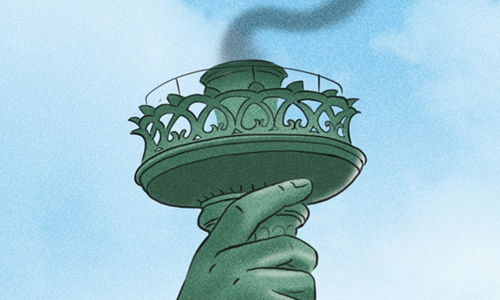Corporate monopolies dash American dreams

Illustration: Liu Rui/GT
When Elaine Chao was nominated as Secretary of Labor by then US president George W. Bush around noon on January 11, 2001, she only had two hours to prepare for a speech. She changed clothes and called her husband and her father. At the same time, she thought of what to speak. Then she appeared on TV and mentioned her experience when she first landed on the US.Chao said that life was difficult when she came to New York City with her mother. Her father had to take three jobs to make ends meet. She did not understand English at all upon entering school, and could only write down the teacher's words on the blackboard and wait until her father came home to translate for her. She also talked about her confidence achieving the American dream which she thought could be achieved with hard work, and persistence, plus assistance from friends and family.
But what exactly is the American dream? That is why the melting pot of the US is important and attractive to so many people. It can provide opportunities for a better life. It can also furnish nicer housing and a better education for people from different races and backgrounds.
Of course, all these can only be materialized through one's own hard work, as the dream goes.
However, today's American dream is losing its past luster.
When I told the story of Chao to an American college student, he said that although many people realized their American dreams through personal efforts, such chances have become slimmer. He noted that the rise of former president Donald Trump was not brought about by hard working. It was the result of capitalist power. "You no longer have more opportunities, even if you are a white American," he said.
Some Chinese returnees from the US I encountered also feel the same way. This is also one of the major reasons why they have chosen to return to China.
Obviously, the widening disparity between the rich and the poor is only a manifestation of American problems on the surface. What's behind is the inequality of opportunities caused by the unfair distribution of wealth. The ladder for the middle and lower classes to climb up is becoming narrower. More importantly, it has blocked the way to become rich through hard work. The problems caused by this system have fundamentally shaken the foundation of the American dream.
According to the Financial Times, US tech giants are generally highly profitable. By mid-2020, the six FANMAG companies had a combined stock market value of $6.15 trillion. This is more than the stock market value of all countries in the world, except that in the US and China.
Take a look at the wealth growth of the owner of three leading US tech companies. The COVID-19 pandemic did not affect their revenues at all. Instead, it has made them even richer. Amazon owner Jeff Bezos is the wealthiest man in the world, with his net worth reaching a record of $179.9 billion by March 10. His wealth increased by 59.2 percent in almost a year. Tesla owner Elon Musk's wealth has increased by 575.8 percent over the same period, currently standing at $166.2 billion. Following Bezos and Musk is former Microsoft chairman and CEO Bill Gates, whose personal fortune has reached $125 billion, an increase of 27.5 percent.
Over the past two decades, super multinational corporations have grown rapidly with accumulated wealth. But their contribution to employment has been declining. They have continued to compress the living space of small and medium-sized enterprises, and reduced the employment rate through various methods, including monopoly tactics. The trend has become one of the major causes of social instability and unfairness in the US.
Henry Armand Giroux, a renowned American and Canadian scholar and critic, said that the American style capitalism with a strong neoliberal sense has caused huge injustices, notably in income, medical care and race equality. Moreover, he believes that it is shaping a political, economic and authoritarian system. The system attributes the problems of lower classes to laziness of individuals rather than the failure of the government.
If there are fewer and fewer opportunities for individuals' development, people might ask: Will the American dream still exist?
The author is a senior editor with People's Daily, and currently a senior fellow with the Chongyang Institute for Financial Studies at Renmin University of China. dinggang@globaltimes.com.cn. Follow him on Twitter @dinggangchina



